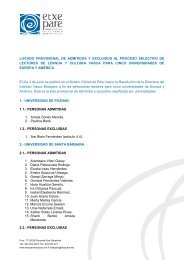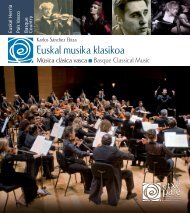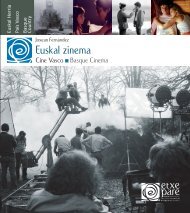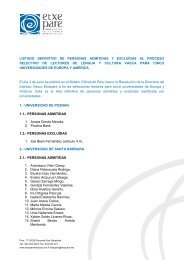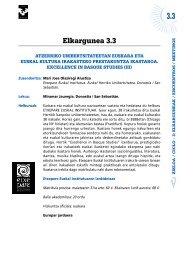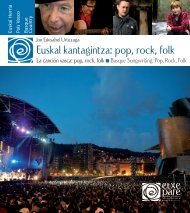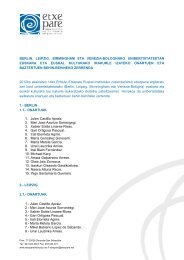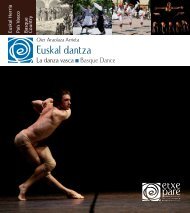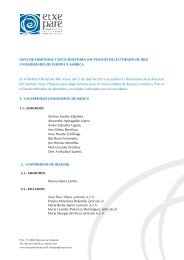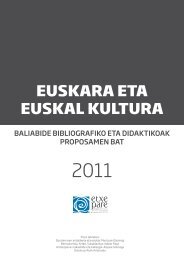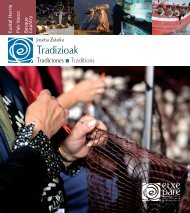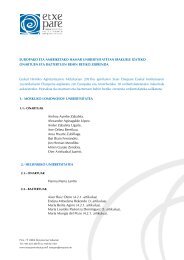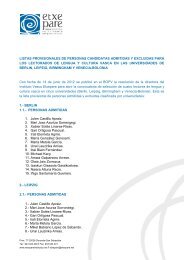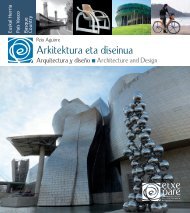XX. mendeko euskal literatura - Etxepare, Euskal Institutua
XX. mendeko euskal literatura - Etxepare, Euskal Institutua
XX. mendeko euskal literatura - Etxepare, Euskal Institutua
You also want an ePaper? Increase the reach of your titles
YUMPU automatically turns print PDFs into web optimized ePapers that Google loves.
<strong>Euskal</strong> <strong>literatura</strong>ren ataria, basqueliterature.com<br />
Portal de la <strong>literatura</strong> vasca, basqueliterature.com<br />
Basque Literature Portal, basqueliterature.com<br />
to que Dominique siente hacia el País Vasco es equiparable<br />
al extrañamiento que en ocasiones muestra<br />
hacia su nuevo hogar, los Estados Unidos. En el que<br />
es quizás el más citado pasaje del libro, el comienzo,<br />
Laxalt nos dice que su padre era un pastor y que las<br />
montañas eran su hogar. Las montañas son un lugar<br />
de frontera, un lugar en suspensión, un tercer lugar si<br />
se prefiere; delimitan pero, al mismo tiempo, unen.<br />
Dominique se encuentra entre dos culturas, dos<br />
mundos que nada tienen que ver el uno con el otro,<br />
y sin embargo se encuentran unidos en su persona.<br />
La suya es ahora una realidad en plural (pero, ¿qué<br />
realidad no los es?), por lo que no admite ser definido<br />
en singular. De ahí que se resista a ser entendido<br />
sólo en base a su pasado o, mejor dicho, a cierto pasado.<br />
Posteriormente, Laxalt publicó la trilogía basada<br />
en las experiencias de una familia vasca emigrada<br />
al oeste americano relatada por un miembro de la<br />
misma, Pete Indart, y compuesta por los siguientes<br />
títulos: The Basque Hotel (1989), Child of the Holy<br />
Ghost (1992) y The Governor’s Mansion (1994).<br />
Sweet Promised Land, which has been described as<br />
faithful rendition of the experience of the emigrant<br />
who returns home to his birthplace after many years<br />
away, is a record of Laxalt’s own impressions on his<br />
first visit to the Basque Country in the company of<br />
his father, Dominique. Whatever the case, one cannot<br />
say that Sweet Promised Land is the testimony<br />
of an assimilated immigrant. The strangeness Dominique<br />
feels for the Basque Country is matched by the<br />
strangeness he continues to feel on occasion in his<br />
new home, the United States. In perhaps the most<br />
cited part of the work, the beginning, Laxalt tells us<br />
his father was a sheepherder and that his home was<br />
the hills. Mountains are a frontier land, a suspended<br />
place, a third place if one prefers; they divide but,<br />
at the same time, they also unite. Dominique finds<br />
himself between two cultures, two worlds that have<br />
nothing in common with one another, and yet they<br />
come together in him. His is now a plural reality<br />
(although what reality isn’t?) which is why he cannot<br />
be defined in the singular. This is why he resists only<br />
being defined by his past or, to put it another way,<br />
by a specific past. Later, Laxalt published a trilogy based<br />
on the experiences of a Basque family that had<br />
emigrated to the American West as told by one of its<br />
members, Pete Indart, and made up of: The Basque<br />
Hotel (1989), Child of the Holy Ghost (1992) and The<br />
Governor’s Mansion (1994).<br />
85



